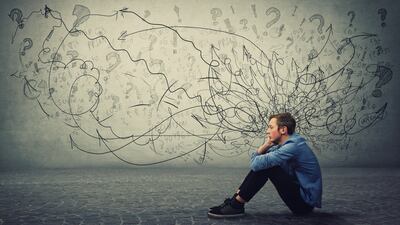Teenagers’ brain development is to blame for the unwise decisions they often make, a study has found.
Adolescents often make choices that get them in trouble and now scientists think they know why – they are less likely to make decisions using planning and picturing different outcomes.
Young people are learning from new experiences they need to balance with already known good choices – all while their brains are undergoing substantial developmental changes. They are known to be more likely to choose a worse option despite a better one being available – decisions that can lead to bad outcomes.
“That simple, suboptimal choice is referred to as ‘decision noise’. Strikingly, this enhanced noise in younger individuals predicts their reliance on complex decisions – a result that was not reported before,” Dr Vanessa Scholz, a postdoctoral research fellow from the University of Würzburg, Germany, told The National.
“We show that the development of higher-level or complex decisions – for example, the planning of choices, mapping different outcomes to actions, flexibly adapting your behaviour – is indeed partially dependent on ones’ level of decision noise. We were surprised by the extent of the impact decision noise has on those cognitive functions.”
What leads the developing brains to make more suboptimal choices is still an open debate, she said. And we still need to understand whether this reflects a benefit or disadvantage for later development. “It could be that poor choices allow teenagers to learn new things, but also hinder development,” said Dr Scholz.
So should we be more understanding of them because it is not their fault? “This is a really great question and something we are targeting in ongoing and future research,” she said. New studies should also target how poor choices decline as adolescents age.
“This can tell us when and under what circumstance adolescent noisy choices can be a benefit or disadvantage for later development,” said Dr Scholz. “Noise, to some extent, could be good to explore new things but with too much you may get stuck with bad outcomes.”
The process could be relevant to conditions like ADHD, where complex choices are known to be impaired and there is a higher portion of “suboptimal” choices.
“But we do not understand yet how they relate. Here, we need more research to explore whether decision noise is an amenable target to improve clinical interventions.”
The teen mind processes information differently from that of a fully formed adult. Experts say that because the frontal lobe – the ‘executive centre’ of good decision-making, impulse control, planning and self-regulation – is not fully formed until about 24 years of age, parents have to help children think through problems.
Parents should encourage their children to consider the long-term consequences of their actions to help the brain form connections to support independent decision-making in the future, Neha Qazi, family psychoeducator and school liaison at Thrive Wellbeing Centrepreviously told The National. “Teens feel happy when trusted with independence and a structured thinking style will also help them feel secure,” she added.


